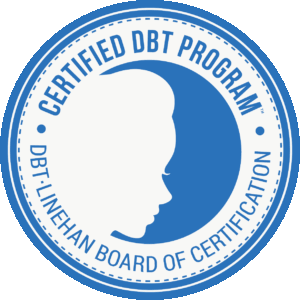In the complex tapestry of human experience, emotions are the vibrant threads that weave through every aspect of our lives. From the exhilarating highs of joy and love to the challenging lows of anger and sadness, our emotional landscape is intricate and dynamic. Navigating this terrain can be both enriching and daunting, often leaving us yearning for effective tools to understand and master our emotions.
Enter Dialectical Behavior Therapy (DBT), a therapeutic approach that offers a beacon of hope for those seeking to not only comprehend but also skillfully manage their emotions. In this blog, we embark on a journey to explore the profound impact of DBT on emotional well-being, unraveling its principles and practical applications. Whether you’re grappling with overwhelming emotions, relationships strained by emotional turbulence, or simply striving for a more balanced emotional life, the insights and strategies of DBT hold the key to unlocking a profound transformation.
Join us as we delve into the essence of Dialectical Behavior Therapy, discovering how it empowers individuals to cultivate emotional resilience, build healthier relationships, and embark on a journey toward self-mastery. The path to mastering your emotions begins here, as we unravel the transformative potential of DBT in fostering a life marked by emotional harmony and well-being.

Understanding Emotion Dysregulation
Emotion dysregulation lies at the heart of many psychological struggles, encompassing a wide range of difficulties in managing and coping with intense emotions. For individuals grappling with conditions such as borderline personality disorder (BPD), post-traumatic stress disorder (PTSD), or mood disorders, the experience of emotional turmoil can be overwhelming and debilitating. DBT provides a comprehensive framework for understanding the roots of emotion dysregulation, drawing upon insights from cognitive-behavioral therapy (CBT), mindfulness practices, and dialectical philosophy.
Origins and Evolution of Dialectical Behavior Therapy (DBT)
Developed by psychologist Dr. Marsha M. Linehan in the late 1980s, DBT originally emerged as a treatment specifically designed for individuals with borderline personality disorder (BPD). Drawing upon her own experiences and insights gained from working with chronically suicidal individuals, Linehan sought to create an approach that combined validation and acceptance with strategies for change. Over the years, DBT has evolved into a versatile and widely-used therapeutic modality, with applications extending beyond BPD to various other mental health challenges.
Core Principles of DBT: Mindfulness as the Foundation
At the heart of DBT lies a set of core principles that form the foundation of its therapeutic approach. Chief among these principles is mindfulness, which involves cultivating present-moment awareness and nonjudgmental acceptance of one’s thoughts, feelings, and experiences. By grounding individuals in the here and now, mindfulness serves as a powerful antidote to the rumination and emotional reactivity that often characterize emotion dysregulation.
Emotion Regulation: Strategies for Managing Intense Feelings
Emotion regulation is a fundamental aspect of Dialectical Behavior Therapy (DBT), underpinning its approach to fostering emotional well-being and resilience. In DBT, individuals are empowered to develop a diverse toolkit of strategies aimed at managing intense feelings and emotional responses effectively. Through a combination of cognitive restructuring, problem-solving techniques, and behavioral strategies, DBT equips individuals with the skills they need to navigate the complex landscape of their inner world with greater ease and resilience. Here are some key strategies for managing intense emotions within the framework of DBT:
Building Emotional Awareness
DBT encourages individuals to develop a keen awareness of their emotional experiences, including the specific triggers and patterns that underlie them. By cultivating mindfulness and self-observation, individuals can begin to identify and label their emotions more accurately, laying the groundwork for effective regulation.
Identifying Triggers and Patterns
Central to DBT is the recognition that emotions are often triggered by specific events, thoughts, or external stimuli. Through collaborative exploration with a therapist, individuals learn to identify their unique emotional triggers and patterns, gaining insight into the underlying factors that contribute to emotional dysregulation.
Cognitive Restructuring
DBT emphasizes the role of cognitive restructuring in modifying unhelpful thought patterns and beliefs that contribute to emotional distress. By challenging negative self-talk and cognitive distortions, individuals can reframe their perspectives and cultivate more adaptive ways of thinking about themselves and their experiences.
Problem-Solving Techniques
In DBT, individuals are taught practical problem-solving skills to address the underlying issues that contribute to emotional distress. By breaking down problems into manageable components and brainstorming potential solutions, individuals can develop a sense of agency and efficacy in managing challenging situations.
Behavioral Strategies
DBT incorporates a range of behavioral techniques aimed at regulating emotions and promoting adaptive coping behaviors. These may include relaxation exercises, grounding techniques, assertiveness training, and behavioral activation strategies designed to enhance mood and reduce emotional arousal.
Implementing Healthy Coping Mechanisms
Finally, DBT encourages individuals to cultivate a repertoire of healthy coping mechanisms to manage intense emotions effectively. This may involve engaging in pleasurable activities, seeking social support, practicing self-care, or utilizing previously learned DBT skills in times of distress.
Coping with Crisis and Urges
In addition to emotion regulation, DBT places a strong emphasis on distress tolerance skills, which are essential for coping with crisis situations and intense emotional urges. By learning to tolerate distress without resorting to harmful or impulsive behaviors, individuals can navigate challenging circumstances with greater composure and effectiveness. From practicing relaxation techniques to engaging in self-soothing activities, DBT offers a range of strategies to help individuals weather the storms of life with resilience and grace.
Navigating Relationships with Skill and Confidence
Healthy relationships are essential for emotional well-being, yet they can also be a source of profound stress and conflict. In DBT, interpersonal effectiveness skills are designed to empower individuals to communicate assertively, set boundaries, and negotiate conflicts in a manner that fosters mutual respect and understanding. By enhancing their interpersonal skills, individuals can cultivate more fulfilling and harmonious relationships, both in their personal and professional lives.
Balancing Acceptance and Change
Central to the philosophy of DBT is the concept of dialectics, which emphasizes the importance of finding a balance between acceptance and change. Rather than viewing these two principles as contradictory, DBT encourages individuals to embrace them as complementary aspects of the same process. By walking the middle path between radical acceptance and proactive change, individuals can cultivate a sense of inner peace and empowerment, even in the face of life’s inevitable challenges and uncertainties.
Practical Applications and Exercises
While DBT was originally developed as a structured treatment program delivered in a clinical setting, its principles and techniques can be applied in various contexts and settings. From self-help workbooks to online resources and support groups, there are numerous ways to integrate DBT into everyday life. By incorporating DBT principles and exercises into their daily routines, individuals can reinforce their skills and continue their journey toward emotional mastery and well-being.

Overcoming Common Challenges in DBT Practice
Navigating the path of Dialectical Behavior Therapy (DBT) isn’t always smooth sailing. Like any therapeutic approach, DBT comes with its fair share of challenges and hurdles. However, facing these obstacles head-on can lead to profound growth and transformation. Here are some common challenges individuals may encounter along their DBT journey, along with strategies for overcoming them:
- Resistance to Change: Embracing new ways of thinking and behaving can be daunting, but with persistence and support, individuals can gradually overcome resistance and embrace the transformative potential of DBT.
- Difficulty Applying Skills: While learning DBT skills in therapy sessions is important, applying them in real-life situations can pose challenges. Through practice and patience, individuals can strengthen their skills and navigate everyday challenges with greater confidence.
- Emotional Intensity: Dealing with intense emotions is a core aspect of DBT practice. By learning effective emotion regulation techniques and building distress tolerance skills, individuals can gain greater control over their emotional responses and navigate life’s ups and downs with resilience.
- Limited Resources: Accessing DBT therapy and resources may be challenging for some individuals due to factors such as cost or availability. Seeking out alternative resources, such as self-help workbooks or online support groups, can help individuals continue their DBT journey even in the face of obstacles.
- Maintaining Commitment: Sustaining motivation and commitment to DBT practice over time can be difficult. Regular check-ins with a therapist, setting achievable goals, and celebrating progress can help individuals stay engaged and motivated on their journey toward emotional mastery.
The Transformative Journey: Success Stories and Testimonials
Finally, no exploration of DBT would be complete without acknowledging the transformative impact it has had on countless individuals around the world. From overcoming chronic suicidality to rebuilding fractured relationships and reclaiming a sense of purpose and meaning, the stories of those who have benefited from DBT are both inspiring and illuminating. By sharing these success stories and testimonials, we hope to inspire others to embark on their own journey toward emotional mastery and well-being through the power of Dialectical Behavior Therapy.
As we conclude our exploration of Dialectical Behavior Therapy (DBT) and its transformative potential in mastering emotions, it’s clear that DBT of South Jersey offers a beacon of hope for those seeking greater emotional resilience and well-being. Through its principles of mindfulness, emotion regulation, distress tolerance, and interpersonal effectiveness, DBT provides a comprehensive toolkit for navigating life’s challenges with skill and confidence.
If you find yourself struggling with overwhelming emotions, turbulent relationships, or a sense of inner turmoil, consider exploring Dialectical Behavior Therapy with DBT of South Jersey as a path toward healing and transformation. Whether through self-help resources, online courses, or working with a trained therapist, there are numerous ways to embark on your DBT journey.
Take the first step today toward mastering your emotions and reclaiming control over your life with DBT of South Jersey. Your journey toward emotional well-being starts now.




